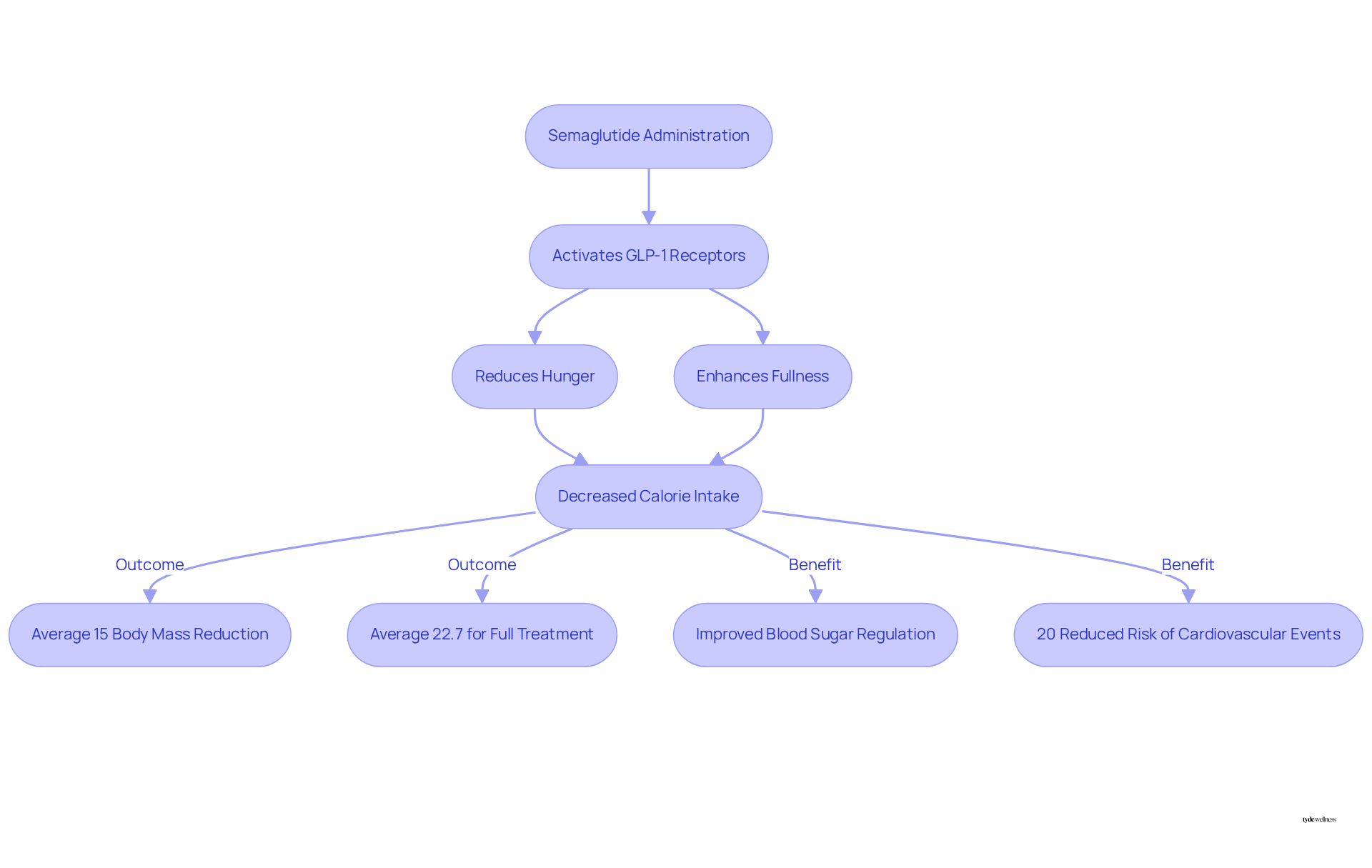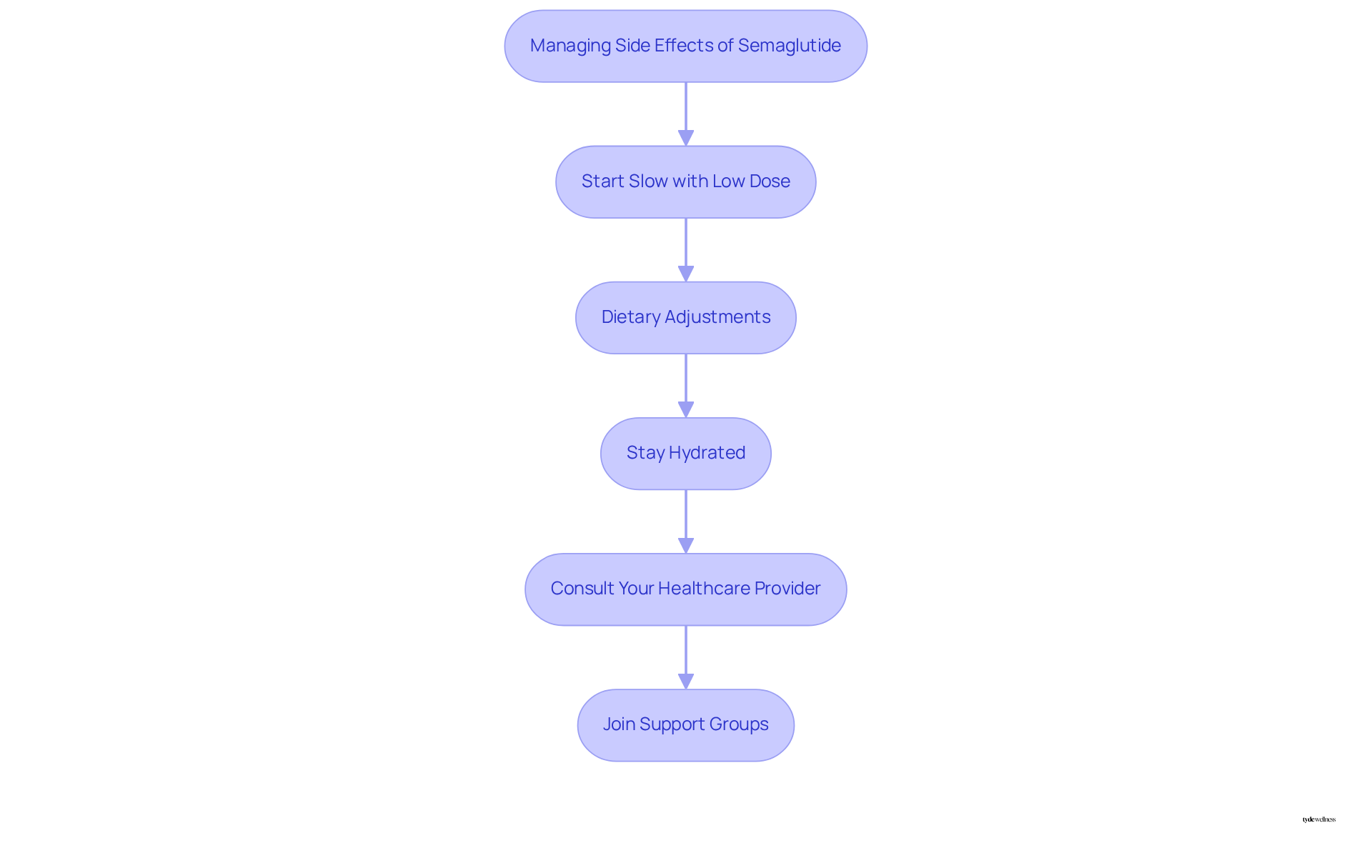Overview
The article focuses on the effective use of low-dose semaglutide for maintenance in weight management. It outlines a structured approach that begins with a low dose to minimize side effects. Furthermore, it integrates lifestyle and nutritional changes, emphasizing the importance of personalized dosing strategies. Supported by clinical evidence, this approach demonstrates significant weight loss outcomes, highlighting the benefits of tailored treatment plans.
Introduction
Semaglutide has emerged as a pivotal advancement in the field of weight management, especially for individuals grappling with hormonal changes. This GLP-1 receptor agonist not only reduces appetite and increases feelings of fullness but also provides substantial metabolic advantages, establishing it as an essential resource for long-term weight maintenance.
As many individuals begin their journey with low-dose semaglutide, pertinent questions arise:
- How can one adeptly manage the dosing process and seamlessly incorporate this medication into a daily regimen?
- What strategies can be employed to maximize its benefits while effectively addressing potential side effects?
This article explores the critical steps for utilizing low-dose semaglutide effectively, empowering readers to reach their weight management objectives.
Explore Semaglutide: Mechanism and Benefits for Weight Maintenance
Semaglutide acts as a GLP-1 receptor agonist, effectively mimicking the glucagon-like peptide-1 hormone, which plays a crucial role in appetite regulation and glucose metabolism. By activating GLP-1 receptors in the brain, this medication significantly reduces hunger and enhances feelings of fullness, leading to decreased calorie intake. This mechanism is particularly beneficial for women undergoing hormonal changes during perimenopause and menopause, periods often associated with increased appetite and weight gain.
Clinical studies indicate that this medication can facilitate a significant reduction in body mass, with participants achieving an average decrease of 15% in body mass over 68 weeks. Notably, among those who completed the full treatment, the average loss in body mass rose to 22.7%.
Furthermore, this medication has shown positive effects on metabolic health, including improved blood sugar regulation and a 20% reduction in the risk of serious cardiovascular events or mortality in adults without diabetes. This positions semaglutide as a vital resource for sustainable weight management.

Implement Low-Dose Semaglutide: Dosing Strategies for Effective Maintenance
To initiate semaglutide treatment, it is advisable to start with a low dose of 0.25 mg once weekly for the first four weeks. This introductory phase allows the body to adjust to the medication while minimizing potential side effects, such as nausea. After this phase, the dosage may be raised to 0.5 mg weekly, and then to 1.0 mg and subsequently 1.7 mg, depending on personal tolerance and goals for reduction. The typical maintenance dose ranges from 1.7 mg to 2.4 mg weekly. Monitoring your body’s response to each dosage is crucial, and consulting with a healthcare provider for necessary adjustments is recommended.
Research shows that low dose semaglutide for maintenance can be equally effective as higher doses for maintaining body composition, emphasizing the significance of establishing the ideal balance suited to your needs. In a study involving participants who followed their treatment, those on low dose semaglutide for maintenance still achieved significant reductions in body mass, reinforcing the value of personalized dosing strategies. Participants in the Tyde Wellness program reported an average body mass reduction of 15% after 68 weeks, showcasing the effectiveness of personalized approaches.
Furthermore, a case study from an online obesity clinic discovered that patients attained clinical trial-level weight loss using low dose semaglutide for maintenance, further supporting the effectiveness of personalized dosing. Typical side effects of the medication include gastrointestinal problems such as nausea and vomiting, which are crucial to consider during treatment.

Integrate Semaglutide into Your Routine: Lifestyle and Nutritional Adjustments
To effectively integrate semaglutide into your routine, consider implementing the following lifestyle and nutritional adjustments:
-
Balanced Diet: Emphasize a diet abundant in lean proteins, whole grains, fruits, and vegetables. Smaller, more frequent meals can help manage hunger and sustain energy levels, which is crucial during hormonal transitions. Research shows that participants in Tyde Wellness programs report an average body weight loss of 15% after 68 weeks, highlighting the importance of dietary choices in achieving weight loss goals.
-
Hydration: Ensure adequate hydration by drinking plenty of water throughout the day. Maintaining hydration aids metabolic functions and may alleviate certain typical side effects, such as nausea.
-
Regular Exercise: Aim for at least 150 minutes of moderate exercise each week. Activities like walking, swimming, or yoga are particularly beneficial for women navigating hormonal changes, as they promote physical health and emotional well-being. For example, Meredith Schorr shed 50 pounds over 11 months utilizing a medication, which she enhanced with consistent physical exercise.
-
Sleep and Stress Management: Prioritize quality sleep and incorporate stress-reduction techniques such as meditation or deep breathing exercises. Both sleep and stress management are important factors in managing body mass and overall well-being, especially for individuals using low dose semaglutide for maintenance. Dr. Louis Aronne stresses that continuous lifestyle management is essential for sustaining loss attained through medication.
By making these adjustments, you can improve the effectiveness of this medication and aid your management journey.

Manage Side Effects and Challenges: Navigating Your Semaglutide Journey
While this medication is generally well-accepted, some individuals may encounter reactions such as nausea, diarrhea, or abdominal discomfort. In clinical trials, participants who were on low dose semaglutide for maintenance lost an average of 15% of their body weight, underscoring the importance of effectively managing these challenges during the weight loss journey. Here are strategies to help you navigate these side effects:
- Start slow with low dose semaglutide for maintenance by beginning with the lowest dose and gradually increasing it to allow your body to adjust. This method, which involves low dose semaglutide for maintenance, reduces possible adverse reactions and enhances your overall experience with the medication.
- Dietary Adjustments: Eating smaller, bland meals can help alleviate gastrointestinal discomfort. Avoid high-fat and spicy foods that may exacerbate symptoms, as these can lead to increased nausea or digestive issues.
- Stay Hydrated: Ensure sufficient fluid consumption to help handle side reactions and support overall health. Hydration can mitigate nausea and improve digestion, making your experience more comfortable.
- Consult Your Healthcare Provider: If symptoms continue or intensify, contact your healthcare provider for possible modifications to your treatment plan. They can offer tailored advice based on your specific situation.
Additionally, consider joining support groups or online forums where you can share experiences and gain insights from others on a similar journey. Engaging with a community can provide emotional support and practical tips for navigating the challenges of semaglutide treatment. As Dr. Ivania Rizo notes, gastrointestinal side effects are common with GLP-1 medications, and having a support system can be invaluable when using low dose semaglutide for maintenance during this process. Tyde Wellness’s holistic approach, which combines GLP-1 therapy with personalized nutrition and ongoing support, can further enhance your weight loss journey and help you achieve lasting results.

Conclusion
Utilizing low-dose semaglutide effectively for weight maintenance necessitates a comprehensive understanding of its mechanisms, appropriate dosing strategies, and necessary lifestyle adjustments. This medication aids in appetite regulation and glucose metabolism while significantly contributing to sustainable weight management, particularly for individuals experiencing hormonal changes. By initiating treatment with a low dose and gradually increasing it, individuals can minimize side effects while still achieving substantial weight loss results.
Key insights from the article emphasize the importance of personalized dosing strategies, which have demonstrated effectiveness comparable to higher doses for maintaining body composition. Furthermore, integrating lifestyle changes such as:
- A balanced diet
- Regular exercise
- Proper hydration
can enhance the medication’s effectiveness. It is crucial to monitor one’s response to the treatment and consult healthcare providers for tailored advice, ensuring a supportive and adaptive approach to any challenges encountered during the journey.
In conclusion, embracing low-dose semaglutide as part of a holistic weight management plan can lead to significant health benefits. The combination of appropriate dosing, lifestyle modifications, and community support empowers individuals to navigate their weight maintenance journey successfully. Taking proactive steps today can pave the way for lasting results and improved overall well-being.
Frequently Asked Questions
What is semaglutide and how does it work?
Semaglutide is a GLP-1 receptor agonist that mimics the glucagon-like peptide-1 hormone, playing a crucial role in appetite regulation and glucose metabolism. It activates GLP-1 receptors in the brain, significantly reducing hunger and enhancing feelings of fullness.
Who can benefit from semaglutide?
Semaglutide is particularly beneficial for women undergoing hormonal changes during perimenopause and menopause, which are often associated with increased appetite and weight gain.
What are the clinical outcomes associated with semaglutide?
Clinical studies indicate that semaglutide can facilitate an average reduction of 15% in body mass over 68 weeks, with participants who completed the full treatment achieving an average loss of 22.7%.
Does semaglutide have any effects on metabolic health?
Yes, semaglutide has shown positive effects on metabolic health, including improved blood sugar regulation and a 20% reduction in the risk of serious cardiovascular events or mortality in adults without diabetes.
How does semaglutide contribute to sustainable weight management?
By effectively reducing hunger and enhancing feelings of fullness, semaglutide aids in decreasing calorie intake, making it a vital resource for sustainable weight management.
List of Sources
- Explore Semaglutide: Mechanism and Benefits for Weight Maintenance
- Health benefits of semaglutide — Beyond weight loss – Mayo Clinic Press (https://mcpress.mayoclinic.org/living-well/health-benefits-of-semaglutide-beyond-weight-loss)
- 16 New Weight Loss Drugs – GoodRx (https://goodrx.com/conditions/weight-loss/new-weight-loss-drugs?srsltid=AfmBOopta47lk0l_H0Um2OrJ-6VWNX7EhiXu9ADvtJTQB748ElbjAlst)
- Monthly weight loss drug helps people lose 20% of body weight, trial finds (https://nbcnews.com/health/health-news/monthly-weight-loss-drug-helps-people-lose-20-body-weight-trial-finds-rcna214080)
- Powerful new weight-loss drug helps patients shed 20 percent of body weight, study finds (https://uab.edu/news/research-innovation/powerful-new-weight-loss-drug-helps-patients-shed-20-percent-of-body-weight-study-finds)
- Long-term weight loss effects of semaglutide in obesity without diabetes in the SELECT trial – Nature Medicine (https://nature.com/articles/s41591-024-02996-7)
- Implement Low-Dose Semaglutide: Dosing Strategies for Effective Maintenance
- Low dose of weight loss drug may improve heart failure symptoms with minimal weight loss (https://newsroom.heart.org/news/low-dose-of-weight-loss-drug-may-improve-heart-failure-symptoms-with-minimal-weight-loss)
- Online obesity clinic achieves clinical trial-level weight loss with lower semaglutide doses (https://news-medical.net/news/20250512/Online-obesity-clinic-achieves-clinical-trial-level-weight-loss-with-lower-semaglutide-doses.aspx)
- Cleveland Clinic Research Finds Injectable Medications for Obesity Produce Smaller Weight Loss in A Real-World Setting, Compared to Randomized Clinical Trials (https://newsroom.clevelandclinic.org/2025/06/10/cleveland-clinic-research-finds-injectable-medications-for-obesity-produce-smaller-weight-loss-in-a-real-world-setting-compared-to-randomized-clinical-trials)
- Once-Weekly Semaglutide for Weight Management: A Clinical Review – PMC (https://pmc.ncbi.nlm.nih.gov/articles/PMC9272494)
- Integrate Semaglutide into Your Routine: Lifestyle and Nutritional Adjustments
- Who will benefit from new ‘game-changing’ weight-loss drug semaglutide? (https://uab.edu/news/research-innovation/who-will-benefit-from-new-game-changing-weight-loss-drug-semaglutide)
- What it’s like to stay on Ozempic for years (https://nbcnews.com/health/health-news/ozempic-what-its-like-to-take-for-years-rcna93921)
- Woman shares what happened after she stopped taking semaglutide (https://abcnews.go.com/GMA/Wellness/person-stops-taking-semaglutide-woman-shares-story/story?id=97898437)
- The new weight-loss drugs and cancer (https://fredhutch.org/en/news/center-news/2024/03/the-new-weight-loss-drugs-and-cancer.html)
- Weight-loss drugs aren’t a magic bullet. Lifestyle changes are key to lasting health (https://npr.org/sections/health-shots/2024/02/12/1229920739/weight-loss-drugs-ozempic-arent-magic-bullet-lifestyle-changes-lasting-health)
- Manage Side Effects and Challenges: Navigating Your Semaglutide Journey
- Ozempic face (and other GLP-1 side effects) (https://uclahealth.org/news/article/ozempic-face-and-other-glp-1-side-effects)
- Ozempic: Side effects and how to manage them (https://medicalnewstoday.com/articles/drugs-ozempic-side-effects)
- Harvard and CDC study: Serious side effects from semaglutide are uncommon – Harvard Health (https://health.harvard.edu/staying-healthy/harvard-and-cdc-study-serious-side-effects-from-semaglutide-are-uncommon)
- Serious side-effects for popular weight loss drugs raising concerns (https://wjla.com/news/spotlight-on-america/serious-side-effects-for-popular-weight-loss-drugs-raising-concerns-risk-benefits-health-obesity-glp1-zepbound-wegovy-mounjaro-semiglutide-medication)
- News: Patients grapple with side effects of… (The Washington Post) – Behind the headlines – NLM (https://ncbi.nlm.nih.gov/search/research-news/19303)



